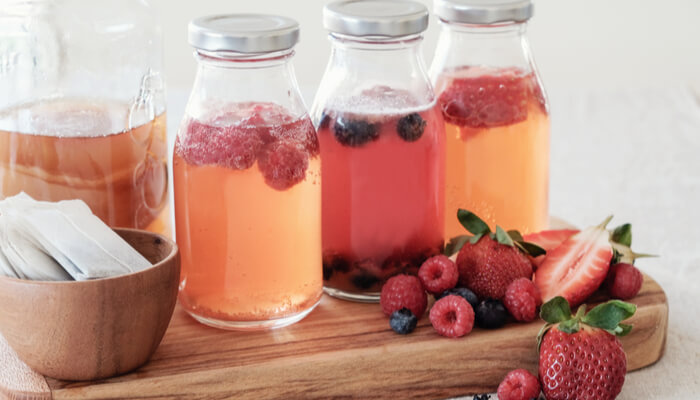Shutterstock
You’ve probably seen it at your corner bodega. Maybe on tap at that super-hip coffee shop you always feel awkward going into, like you’re not cool enough to order there. Definitely in the fridge of your favorite hippy friend who takes 100 natural health supplements a day and swears that her yogi can cure your migraines.
Kombucha has exploded in popularity in the past few years and is now more mainstream than ever. Over $600 million worth of kombucha was sold in 2018, and those numbers are expected to increase this year.

But what is it, why is it so crazy popular, and does it actually do anything for you?
We have the answers.
The oldest recorded use of kombucha probably dates back to 2500 BCE, during the reign of the pharaoh Khufu who commissioned the Great Pyramid. Others suggest that it originated in China during the third century BCE, and some even believe it was brought to Korea from Japan in 414 AD to treat the Emperor’s illness.
Where ever it came from, it’s popular now!
Kombucha is a fermented tea. The base of kombucha is simple – you start with a SCOBY or symbiotic culture of bacteria and yeast. It’s sometimes referred to as the ‘mother’. A SCOBY looks and feels sort of like wet playdough.
After you have your SCOBY, you add can add hot tea and sugar to it, allowing it to dissolve. After the basics are taken care of, the kombucha gets stored in a room temperature area for between a week and a month, depending on how ‘strong’ you want it to be. It is covered with a breathable cloth so that the air inside of it can escape, but dirt or dust cannot get into the liquid.
Afterward, most companies add flavorings, juices, or more sugars to improve the taste. Without anything to ‘boost’ the flavor, kombucha has a tendency to smell and taste like vinegar and yeast. No, that doesn’t sound appealing to us either.
Kombucha is technically a bacterial colony, but it’s a collection of good bacteria, not bad. Many people claim that kombucha is a great source of probiotics. Probiotics are credited for good gut health, which can help digestion, prevent diarrhea, help allergies, chronic skin conditions, and even improve mental clarity.
Not only does it contain good bacteria, but there is also some evidence to suggest it will kill off bad bacteria. Kombucha is an acetic acid, which is similar to vinegar. It can help stop the growth of bacteria and yeast that would be harmful to you and your digestive system.
Finally, there is some evidence that drinking kombucha might even help prevent heart disease, which is the biggest killer right now. Studies in rats show that it can improve your ‘good’ cholesterol levels while decreasing your ‘bad’ cholesterol levels. You’re also essentially drinking an intense tea when you drink kombucha, and regular green tea drinkers are 31% less likely to develop heart disease in their lifetime.
The short answer: Yes!
The long answer is a little more complicated.
Kombucha appears to have a lot of health benefits, but nothing so solidly backed in science that you must consume it daily. We recommend drinking it once a week to every few times a week, as you wish (Or can afford – kombucha is expensive!). No two brands or even batches are the same, so experiment a bit until you find a flavor or type you like.
Kombucha made from green tea is going to be better for you, but black or oolong tea has health benefits as well if you can’t stand the flavor.
There doesn’t seem to be a downside to drinking kombucha and a lot of potential benefits to this fermented drink. If you can get over the bubbles and yeasty flavor, it can do you a lot of good!